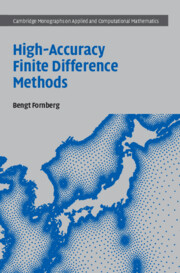Book contents
- Frontmatter
- Contents
- Preface
- 1 Introduction to Finite Difference Methods
- 2 Brief Summary of Pseudospectral Methods
- 3 FD Approximations for Ordinary Differential Equations
- 4 Grid-based FD Approximations for Partial Differential Equations
- 5 Mesh-Free FD Approximations
- 6 FD in the Complex Plane
- 7 FD-based Methods for Quadrature and Infinite Sums
- 8 Fractional-Order Derivatives
- Appendix A Polynomial Interpolation
- Appendix B Splines
- Appendix C Fourier Transforms, Fourier Series, and the FFT Algorithm
- Appendix D Lagrange Multipliers
- Appendix E Extrapolation Methods
- Appendix F Trade-offs between Accuracy Orders and Other Approximation Features
- Appendix G Node Sets for FD and RBF-FD-based PDE Discretizations
- References
- Index
Appendix E - Extrapolation Methods
Published online by Cambridge University Press: 16 May 2025
- Frontmatter
- Contents
- Preface
- 1 Introduction to Finite Difference Methods
- 2 Brief Summary of Pseudospectral Methods
- 3 FD Approximations for Ordinary Differential Equations
- 4 Grid-based FD Approximations for Partial Differential Equations
- 5 Mesh-Free FD Approximations
- 6 FD in the Complex Plane
- 7 FD-based Methods for Quadrature and Infinite Sums
- 8 Fractional-Order Derivatives
- Appendix A Polynomial Interpolation
- Appendix B Splines
- Appendix C Fourier Transforms, Fourier Series, and the FFT Algorithm
- Appendix D Lagrange Multipliers
- Appendix E Extrapolation Methods
- Appendix F Trade-offs between Accuracy Orders and Other Approximation Features
- Appendix G Node Sets for FD and RBF-FD-based PDE Discretizations
- References
- Index
Summary
Although extrapolation intrinsically is a less stable task than interpolation, it can nevertheless in many cases be highly effective. In the context of FD methods, a common situation is to have numerical results for a sequence of step sizes h approaching h = 0, together with theoretical knowledge that the computed solution (pointwise) possesses a convergent Taylor expansion (with unknown coefficients) around h = 0. Extrapolation down to h = 0 is then well posed and is known as Richardson extrapolation. Deferred correction is another option that sometimes can provide several additional orders of accuracy from a lower-order scheme (described in Chapter 3). The two methods just mentioned can be characterized as linear. In other applications, such as accelerating slowly converging iterations and evaluations of infinite sums, nonlinear techniques are often more effective. Two such methods are briefly described here: Aitken extrapolation and conversion of truncated Taylor expansions to Padé rational form. Such methods can in certain contexts provide spectacularly effective extrapolations (although strict error analysis often is difficult or unavailable).
Information
- Type
- Chapter
- Information
- High-Accuracy Finite Difference Methods , pp. 185 - 193Publisher: Cambridge University PressPrint publication year: 2025
